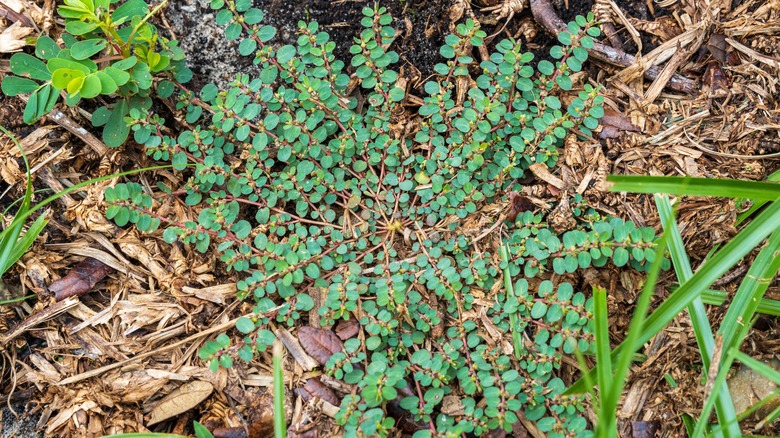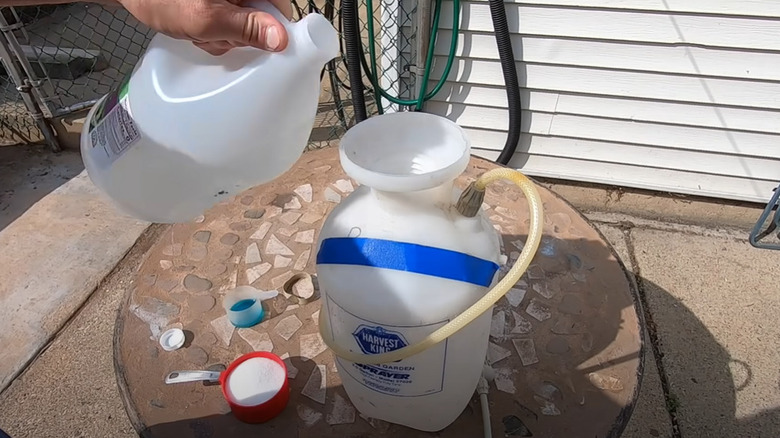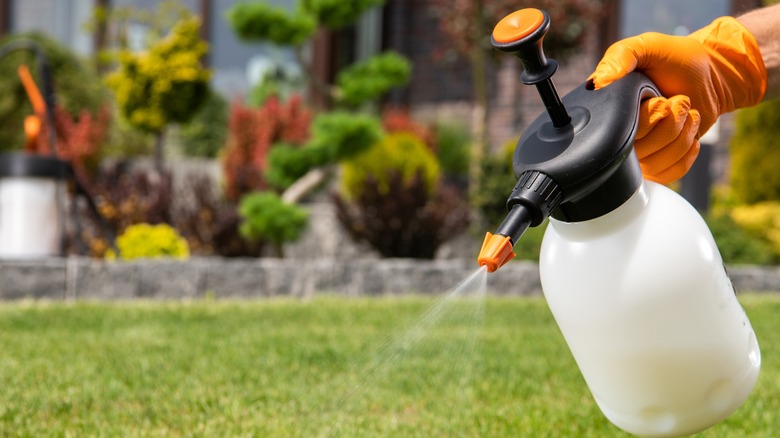The Common Ingredient That Can Help Wipe Out Fast-Spreading Spurge Weed
We may receive a commission on purchases made from links.
Ah, spotted spurge weed! This leafy marauder, recognized by scholars as the Euphorbia maculata, is a foe no gardener wishes to tangle with. It stands low to the ground, supported by reddish, hair-smothered stems, brandishing oval-shaped, dark green leaves adorned with a maroon blotch in the middle — a badge reminiscent of a warrior's emblem. This audacious plant doesn't demand rich soil or lush landscapes, instead finding great pleasure in the weak areas of your lawn. Merely five weeks post-germination, it's already a proud parent to a legion of seeds poised to burst into life as soon as the warm cloak of summer graces us. Although synthetic herbicides are tempting, a safer, equally potent solution for removing spurge weed from your yard rests in your kitchen pantry — vinegar.
Vinegar's weed-busting might resides in its acetic acid content. According to Montana State University, acetic acid acts on contact and, playing no favorites, affects all that it comes into contact with. It instigates a physiological catastrophe in the weed: Fluids leach out of the plant cells, resulting in operational paralysis. This biological chaos dries out the tissues, effectively killing the weeds. Acetic acid's power proves lethal particularly on young spurge weeds, with its efficacy escalating with the concentration. Superior and widely available, vinegar parallels the power of synthetic herbicides in the crusade against spurge weeds, minus the harmful chemicals.
How to get rid of spurge weed with vinegar spray
With vinegar, dish soap, and salt, you create a potent potion for getting rid of weeds like spurge. Salt ups this game by fueling dehydration, while soap helps the blend spread and linger on the leaves. However, household vinegar (5% acetic acid) is too lenient on that leafy foe. Go all "Rambo" with the herbicidal counterpart sporting a hefty 20% acetic acid — a concentration the U.S. Department of Agriculture endorses. An excellent recommendation would be Green Gobbler 20% Vinegar Weed & Grass Killer, selling for $26.98 per gallon on Amazon.
Lest we forget, vinegar is an all-out plant destroyer that won't discriminate between desirable plants and those we'd rather do without. So, enlist the aid of cardboard or plastic sheeting to keep the valuables safe. A blend of a tablespoon of dish soap, a cup of salt, and a gallon of vinegar is recommended. Fill only three-quarters of your spray bottle to secure room for mixing and store the remaining vinegar solution for future skirmishes.
Afterward, shake the bottle well, switch on the battle mode, and fire a direct spray at the spurge weed. For spurge weed control in lawns, "painting" the green invader's leaves and stem with a vinegar-soaked paintbrush is a great option. However, neither application option is a hit-and-run. After 48 hours of strike, assess the damage — brown, wilted spurge weeds mark your victory. If the weeds survived the onslaught, hit them again with vinegar.
Caveats for killing spurge weed with herbicidal vinegar
Picture a sunny day when the thermometer reads a balmy 65 degrees Fahrenheit or above — that's the perfect weather to brandish your vinegar weapon on spurge weeds. The reason is simple: Acetic acid, as with other herbicides, is more effective when the weeds, unaware of impending doom, are actively photosynthesizing. In addition, check the weather forecast; a sudden downpour can wash away recently applied vinegar, leaving the weeds unscathed. While the wind makes a warm day more enjoyable, it turns foe here as it can carry vinegar particles off target to your precious plants or towards you.
At a formidable 11% or above, vinegar can instigate severe chemical burns. Therefore, suit up in protective clothing, including gloves, long sleeves, pants, and safety glasses. Also, recognize that the first tango with vinegar might not topple the spurge weeds completely, and repeated applications might be necessary. But exercise caution. Per the University of Maryland, frequent exposure to acetic acid can trigger undesirable effects on your respiratory system and teeth.
Once you've slain the pesky spurge weed, revel in the glory, not the mess left behind. Ditch remnants in a trash bag; otherwise, the dethroned mature weeds' seeds could stage a sequel. As for how to stop spurge weed from growing on your lawn, a holistic strategy involving aeration, proper watering, and timely reseeding of barren patches will suffice (per Pennsylvania State University).


